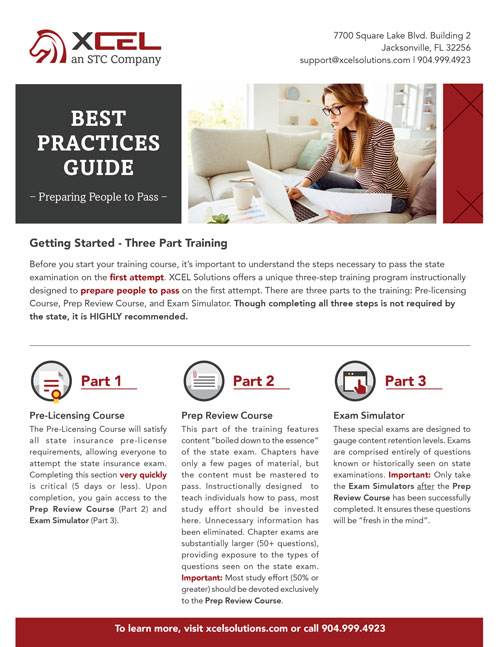As an insurance agent, building a welcome kit for new insurance customers is a crucial step to ensuring long-term success for your clients.
Basically, a welcome kit includes all crucial documents customers need when they purchase an insurance policy — business cards, important phone numbers, policy papers, etc.
While you might already have these items available in your office, assembling them in a professional deliverable for clients will make life easier for both of you. Plus, you can take your welcome kit with you when you’re meeting clients away from the office.
Here are 11 important items you should include in your welcome kit:
1. Business Cards
Even in today’s digital age, having a physical business card gives a good first impression of your business and helps people remember you. It also gives clients a tangible object to share with others when they want to refer business to you. You never know who you’re going to meet. Think of it as the ultimate networking opportunity.
According to a recent study from Credit Donkey, a company’s sales increase by 2.5% for every 2,000 business cards handed out. So don’t miss a critical opportunity to market yourself to current and prospective clients!
2. Policy Documents
While it’s best practice to carry a tablet or device with you to access policy documents, relying on a strong Wi-Fi signal could lead to a lack of connection, ultimately costing you potential sales.
Keep paper documents with you, instead. You can hand these out to clients and walk them through critical information if they have any questions about your insurance products.
3. “Everything We Sell” Sheet
Think of this as a primer for your insurance agency. It’s a piece of paper with a list of all the financial products you sell, so you don’t have to explain all of this information to new clients.
Your “Everything We Sell” Sheet will save a lot of time and could secure more sales.
4. Your Bio
Clients will want to know more about you — your experiences, previous clients, credentials, etc. Explaining all of this information to them can take time, and it’s a lot easier to include it on a sheet of paper.
Hire someone to write, or at least edit, your bio professionally. Research shows that 42.5% of consumers notice spelling and grammar mistakes, and this could influence your sales.
5. Your Identification
While the world of insurance sales has transitioned heavily to digital business models in the past few years, a large percentage of consumers still prefer face-to-face interactions. In fact, 49% of insurance customers say they place a lot of trust in a human advisor in an office over the 12% who say they trust an automated phone/web/email service.
To ease the minds of your potential customers, you should always carry identification on you at all times. You should also keep identification information in your welcome kit for new customers, which will make it easier for consumers to find out more about you.
6. A Good Notebook
Clients will need to take notes meeting you so they can find out more about your insurance products. Keeping a small notebook in your welcome kit will help customers capture information on the go.
Oh, don’t forget to include a pen in your welcome kit, too. Bonus points if it’s branded with your company name and contact information, which will serve a dual purpose as a marketing tool for your business.
7. Accident Information
This all depends on the type of insurance you specialize in. For example, if you sell car insurance, you might want to create a card with information about what clients should do in an emergency — contact emergency services, take photos of the accident, contact your insurance company, etc.
Clients can keep this card in their wallet and refer to it in an emergency situation.
8. Referral Information
Referral marketing can generate up to five times more conversions than any other channel, according to research. A card with information about how your clients can recommend your services to their friends, family, and colleagues will likely provide you with a return on your investment. Keep one of these cards in your welcome kit.
9. Online Review Information
Online reviews are crucial for securing more clients. Research suggests that 93% of customers say online reviews impact their buying decisions. Building a strategy to obtain and share positive reviews of your business can make a significant impact on your credibility.
Including a sheet of paper with information about how your clients can leave you an online review could help you win over new clients and improve sales in the long term. Try it for yourself and see.
10. Insurance Quotes Information
Most customers find insurance quotes complicated, and you won’t have time to explain your calculations to new clients. Including information about insurance quotes in welcome kits will help clients understand your estimates.
Don’t forget to bring a calculator with you when meeting new clients, either. Sure, your smartphone will do the math, but a calculator will provide you with safeguards if your device dies.
11. A “Thank You” Note
A pre-printed thank you note will increase engagement between you and your clients. Thank customers for meeting you to discuss insurance products and choosing you over other companies in the area. This small gesture could help you secure more sales.
These are 11 of the most important things you should include in your welcome kits for new customers. Storing all of these documents in one place will make it easier for clients, and they’ll have all the information they need when purchasing financial products. For more tips, check out this article on ways to optimize your marketing efforts.




